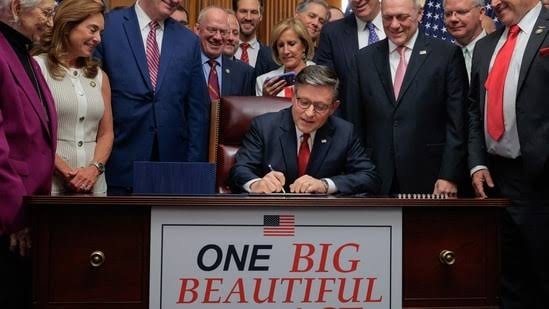On the eve of Independence Day, the US Congress passed President Donald Trump’s much-hyped “Big Beautiful” bill—a sweeping nearly 900-page legislation packed with Republican priorities.
The Senate approved the bill with Vice President JD Vance casting the tiebreaking vote, following a narrow 218-214 passage in the House. Trump is expected to sign the bill into law on July 4 in a high-profile ceremony.
A centerpiece of the bill is $4.5 trillion in tax cuts, including an increase in the child tax credit from $2,000 to $2,200. While this benefits many families, lower-income households may not receive the full credit.
The legislation also introduces temporary deductions on tips, overtime, and auto loan interest, along with a $6,000 deduction for seniors earning under $75,000—aligning with Trump’s pledge to eliminate taxes on Social Security benefits.
However, the bill also reverses several clean energy initiatives, rolling back provisions from the 2022 Inflation Reduction Act. It eliminates consumer incentives for electric vehicles, home charging stations, and energy-efficient home upgrades. Additionally, it shuts down the Greenhouse Gas Reduction Fund, a key program supporting pollution control efforts in local communities.
On immigration and national defense, the bill allocates approximately $350 billion to support what Trump describes as the “largest mass deportation operation in American history.”
Provisions include funding for 100,000 immigration detention beds, 10,000 new ICE officers with $10,000 signing bonuses, and expanded Border Patrol and Defense Department operations. The Pentagon also secures billions for munitions and shipbuilding, and $25 billion for a “Golden Dome” missile defense system.
Healthcare sees significant changes, especially in Medicaid. The bill allocates $50 billion to rural hospitals over five years but imposes cuts by reducing provider taxes from 6% to 3.5% by 2032.
Medicaid payments are suspended for one year to family planning providers offering abortion services, notably Planned Parenthood. Work requirements and stricter eligibility checks are also introduced. The Congressional Budget Office warns the legislation could cause 11.8 million Americans to lose Medicaid coverage over the next decade.
The passage of this expansive bill marks a major legislative victory for Trump and the Republican Party, though it is likely to spark fierce debate over its long-term social and economic impact.





























